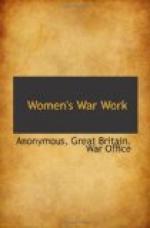* * * * *
“Strength and honour are her
clothing; and she shall rejoice in
time to come.”
—PROV., Chap. 31.
CHAPTER V
WOMAN-POWER FOR MAN-POWER
The first result of the outbreak of war for women was to throw thousands of them out of work.
Nobody knew—not even the ablest financial and commercial men—just what a great European war was going to mean, and luxury trades ceased to get orders; women journalists, women writers, women lecturers, and women workers of every type were thrown out of work and unemployment was very great.
A National Relief Fund was started for general distress and the Queen dealt in the ablest manner with the women’s problem. She issued this appeal: “In the firm belief that prevention of distress is better than its relief, and employment is better than charity, I have inaugurated the ‘Queen’s Work for Women Fund,’ Its object is to provide employment for as many as possible of the women of this country who have been thrown out of work by the war. I appeal to the women of Great Britain to help their less fortunate sisters through the fund.
“Mary R.”
This appeal was instantly responded to and large sums were subscribed. A very representative Committee of Women was established, with Miss Mary MacArthur, the well known Trade Union leader, as Hon. Secretary and the Queen was in daily touch with its work.
In the dislocation of industry which had caused the committee’s formation, it was found that there was great slackness in one trade or a part of it and great pressure in other parts of it or other trades. The problem was to use the unemployed firms and workers for the new national needs.
The committee considered it part of their work to endeavor to increase the number of firms getting Government contracts, and they created a special Contracts Department, under the direction of Mr. J.J. Mallon, of the Anti-sweating League. They, as a result, advised in regard to the placing of contracts and they undertook to get articles for the Government, or ordered by other sources, manufactured by firms adversely affected by the war or in their own workrooms. They worked with the firms accustomed to making men’s clothing and now unemployed, and found that they could easily take military contracts if certain technical difficulties were removed. They interviewed the War Office authorities, modifications were suggested and approved and the full employment in the tailoring trade which followed gave a greatly improved supply of army clothing. Contracts were secured from the war office for khaki cloth, blankets, and various kinds of hosiery, and these were carried out by manufacturers who otherwise would have had to close down.
The Queen gave orders for her own gifts to the troops, and considerable work was done through trade workshops, care being taken to see that this work was only done where ordinary trade was fully employed. Two contracts from the War Office, typical of others, were for 20,000 shirts and for 2,000,000 pairs of army socks. Over 130 firms received contracts through the committee.




